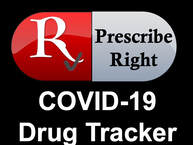|
Hydroxychloroquine and Chloroquine
Oxford University is evaluating hydroxychloroquine and chloroquine as prophylaxis of COVID-19 in health care professionals at risk for infection in the 40,000 patient, COPCOV trial (NCT04303507). The UK Medicines Healthcare Regulatory Agency (MHRA) halted enrollment in the COPCOV study on 5/26/2020. After review, MHRA allowed the study to continue on 6/26/2020. In a 2,541 patient, retrospective study, hydroxychloroquine reduced the hazard ratio for death by 66% and the combination of hydroxychloroquine plus azithromycin reduced the hazard ratio by 71% compared to neither treatment in hospitalized patients with COVID-19. A high number of patients received corticosteroids and a small number received tocilizumab. More patients that received hydroxychloroquine also received a corticosteroid compared to not receiving the drug (78.9% vs 35.7%). The same was true with tocilizumab but use of the drug was small (2.7% vs 1.2%). When controlling for confounders using Cox regression modeling and propensity scores, hydroxychloroquine monotherapy and hydroxychloroquine combined with azithromycin were associated with higher survival among patients with COVID-19. Lopinavir-Ritonavir Researchers at Oxford announced results from the lopinavir-ritonavir arm of the RECOVERY trial. The 11,000 patient RECOVERY trial has several arms testing lopinavir-ritonavir, dexamethasone, hydroxychloroquine, azithromycin, tocilizumab and convalescent plasma. An interim analysis of 1,596 patients enrolled in the lopinavir-ritonavir arm found no decrease in mortality at 28-days compared to 3,376 patients that received only supportive care (22.1% vs 21.3%). Since only 4% of patients were on ventilators, there was not a large enough patient population to determine if the combination had an effect in patients that are mechanically ventilated. Due to the lack of benefit, the researchers discontinued enrollment in the lopinavir-ritonavir arm of the trial. The WHO discontinued the lopinavir/ritonavir arm of the Solidarity Trial 7/4/2020. Sarilumab Sanofi and Regeneron discontinued a Phase III trial when an interim analysis of 194 patients revealed that treatment with sarilumab did not improve the percentage of patients who achieved at least a 1-point change from baseline on a 7-point scale (death to hospital discharge) compared to placebo in COVID-19 patients requiring mechanical ventilation. As of early July 2020, a Sanofi study evaluating sarilumab in the treatment of severe and critical COVID-19 remained active after an interim analysis. COVID-19 Antibodies In early July 2020, Regeneron and NIAID initiated a 2,000 patient, Phase III trial (NCT04452318) to evaluate REGN-COV2 in the prevention of COVID-19 in uninfected people that have had a close exposure to a COVID-19 patient. The U.S. Department of Health and Human Services and Department of Defense awarded Regeneron $450 million for a for large-scale U.S. manufacturing demonstration project to produce REGN-COV2. The goal of the project is to produce 70,000 to 300,000 treatment doses, which would also correspond to 420,000 to 1,300,000 prevention doses, which would be ready to ship by fall. If clinical trials are successful and REGN-COV2 receives Emergency Use Authorization or full approval, the doses could be shipped immediately at no cost, since the government has paid for the doses. COVID-19 Vaccines Novavax has received $1.6 billion grant from the Departments of Defense and Health and Human Services as part of Operation Warp Speed. The grant will cover the manufacture of 100 million doses of its COVID-19 vaccine, NVX-CoV2373, and a Phase III trial. Dose manufacturing and clinical testing will occur in parallel. Novavax expects to begin a 30,000 patient, Phase III trial in the fall. Comments are closed.
|
Stay informed, subscribe to the Prescribe Right Pharmaceutical Pipeline Tracker
Archives
January 2023
Categories |
Services |
Company |
Support |
© COPYRIGHT 2015. ALL RIGHTS RESERVED.
|


 RSS Feed
RSS Feed